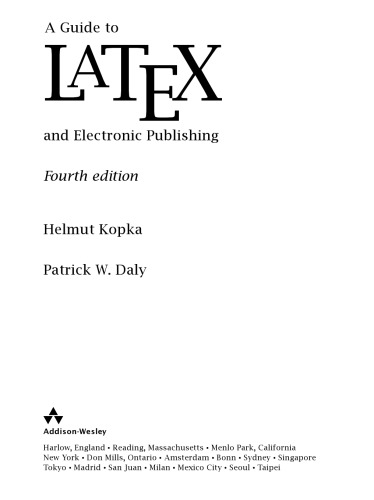

Most ebook files are in PDF format, so you can easily read them using various software such as Foxit Reader or directly on the Google Chrome browser.
Some ebook files are released by publishers in other formats such as .awz, .mobi, .epub, .fb2, etc. You may need to install specific software to read these formats on mobile/PC, such as Calibre.
Please read the tutorial at this link: https://ebookbell.com/faq
We offer FREE conversion to the popular formats you request; however, this may take some time. Therefore, right after payment, please email us, and we will try to provide the service as quickly as possible.
For some exceptional file formats or broken links (if any), please refrain from opening any disputes. Instead, email us first, and we will try to assist within a maximum of 6 hours.
EbookBell Team

4.1
90 reviews
ISBN 10: 0321173856
ISBN 13: 9780321173850
Author: Helmut Kopka, Patrick W Daly
Part I: The Basics
Chapter 1: Introduction
Just what is LaTeX?
Markup Languages
TEX and its offspring
How to use this book
Basics of a LaTeX file
TEX processing procedure
Sample LaTeX file
Chapter 2: Text, Symbols, and Commands
Command names and arguments
Environments
Declarations
Lengths
Special characters
Exercises
Fine-tuning text
Word division
Chapter 3: Document Layout and Organization
Document class
Page style
Parts of the document
Table of contents
Chapter 4: Displaying Text
Changing font style
Centering and indenting
Lists
Generalized lists
Theorem-like declarations
Printing literal text
Comments within text
Chapter 5: Text in Boxes
Boxes
Footnotes and marginal notes
Chapter 6: Tables
Tabulator stops
Tables
Chapter 7: Mathematical Formulas
Mathematical environments
Main elements of math mode
Mathematical symbols
Additional elements
Fine-tuning mathematics
Beyond standard LaTeX
Chapter 8: Graphics Inclusion and Color
The graphics packages
Adding color
Chapter 9: Floating tables and figures
Float placement
Postponing floats
Style parameters for floats
Float captions
Float examples
References to figures and tables in text
Some float packages
Chapter 10: User Customizations
Counters
Lengths
User-defined commands
User-defined environments
Some comments on user-defined structures
Part II: Beyond the Basics
Chapter 11: Document Management
Processing parts of a document
In-text references
Bibliographies
Keyword index
Chapter 12: Bibliographic Databases and BibTeX
The BibTeX program
Creating a bibliographic database
Customizing bibliography styles
Chapter 13: PostScript and PDF
LaTeX and PostScript
Portable Document Format
Chapter 14: Multilingual LaTeX
The babel system
Contents of the language.dat file
Chapter 15: Math Extensions with AMS-LaTeX
Invoking AMS-LaTeX
Standard features of AMS-LaTeX
Further AMS-LaTeX packages
The AMS fonts
Chapter 16: Drawing with LaTeX
The picture environment
Extended pictures
Other drawing packages
Chapter 17: Presentation Material
Slide production with slides class
Slide production with seminar
Slide production with the prosper class
Electronic documents for screen viewing
Special effects with PDF
Chapter 18: Letters
The LaTeX letter class
A house letter style
A model letter customization
guide to latex
overleaf guide to latex
beginners guide to latex
a quick guide to latex
not so short guide to latex
Tags: Helmut Kopka, Patrick W Daly, Guide, LaTeX